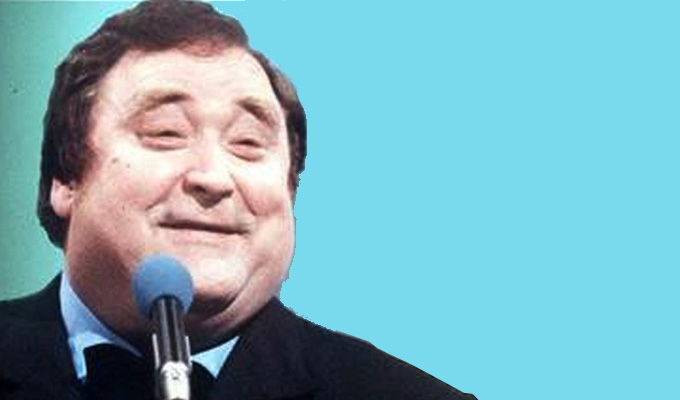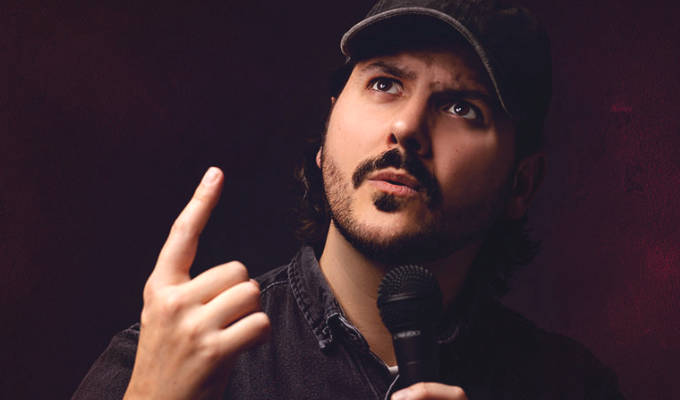
Bernard Manning – Original Review
Note: This review is from 2002
Review by Steve Bennett
Ah, alternative versus mainstream, comedy's perennial debate.In one club, a young black comic positions himself in front of the dark backdrop and asks: "Can you see me?" Twenty-four hours and 120 miles away, a comic pledges support for the striking firefighters, and calls for higher taxes for the rich.
The different approaches almost need no comment. A strong political standpoint is integral to the alternative comedy scene, and a bit of 'Uncle Tom' banter always goes down well in the working men's club.
But the audience that was so delighted with that standard 'black' line was at The Comedy Store, the venue synonymous with the birth of politically-correct alternative comedy. And the second comic was Bernard Manning.
Not that this expression of sympathy for a left-wing cause mark any major U-turn for the comic vilified above all others for his racist, sexist comedy of hate. Rather, it's the alternatives who have gradually changed, not the dinosaur too set in his ways to evolve.
His comment about the firefighters was a bizarre out-of-character aside, just one of several cloddingly sentimental comments that punctuated a tirade of tired pub gags. It's an utterly surreal experience to be bombarded by a torrent of aggressive one-liners and nasty put-downs, peppered with momentary reprieves as Manning's mind wanders onto some trite, mawkish comments about how we all should look after each other.
These aren't even intended to be funny - and some are tinged with depressing melancholy, such as his brief reminiscences about family members who died young (in which he finds time to mention that his dead brother's bank balance was in the millions).
Perhaps these are simply the sentimental ramblings of an old man, or perhaps Bernard's trying to show a softer side; that he's not the monster that he's so often portrayed.
But it's all so schmaltzy. And never more so than when he launches into song (he boasts a surprisingly good baritone voice), literally singing the praises of 'My Kinda Town' - ie wherever he happened to be playing that night. However since tonight's town is Birmingham, the sincerity is hard to swallow.
Indeed it's difficult to square any of his professed humanity with his obvious hatred. You can't take a love and peace message seriously when he follows some almost tearful sermonising about homeless children with a gag starting: "So there's these three niggers..."
His bafflingly mournful laments are simply at odds with his cocksure, often offensive gags. At 72, Manning shows no sign of mellowing - after all, he has an image to maintain.
His usual defence over charges of racism is that he takes the rise out of everyone, himself included. But whereas most of his material is ribald teasing, there's a vile undercurrent of festering hate in anything involving race - and it's not just because it's an automatically sensitive subject to liberal ears.
For while he may mock, say, Liverpudlians as thieving Scousers (an easy stereotype still popular among the lazier hacks on the 'alternative' circuit), gags involving blacks or Asians are always filled with seemingly genuine bile. Even the language shows his disgust - it's always 'niggers' and 'Pakis', whereas 'Irish fellas' are always that, never 'Paddies'.
That said, it's not a relentless tirade of hatred. There are probably no more than half a dozen such gags in his act. But every one is stomach-churning. He likes boxing because it involves black people hurting each other, a lion who eats an African has to lick another beast's backside 'to take away the taste', he'll solve the Northern Ireland problem 'by dropping 1,000 Pakis into Belfast' to give them 'real' Troubles.
All abhorrently nasty stuff. Whether he believes it or not, who can tell? For Manning's comedic landscape is populated by one-dimensional stereotypes and he uses a supposed universal hatred of blacks as part of the same lazy shorthand as, say, stupid Irishmen or tight-fisted Scots.
It truly is comedy of a different era. Although the expected mother-in-law gags are notable by their absence, every other reference is ancient, such as the creaky line about reverse gears in Italian tanks, topical in 1945. (As a cautionary footnote to any 'alternative' comics still peddling doing this, his most up-to-date reference is a line about pro-cannabis marchers being too stoned to protest and demanding munchies instead.)
It's all formula gags you're almost sure to have heard before - and if you haven't, you can work them out ahead of the punchline as they all follow such a familiar pattern.
Twice, at most, I was geniunely wrongfooted by a gag. And, I admit, I laughed. Was that, perhaps, down to Manning's much-vaunted delivery skills?
I doubt it. He's hardly an exceptional performer. But what he does have in his favour is an incredible efficiency - there's not an ounce of fat on any of the gags: set-up, punchline, laugh. But that's easy to do when the jokes have been honed in hundreds of bars across the country.
What Manning also has, of course, is a dedicated audience already on his side. For better or worse, he's an icon able to attract legions of fans, and in interviews, Manning always counters any criticism of his act by the number of people who pay to see - and enjoy - his show.
This night was no exception, Birmingham's Glee Club was filled to its 400 or so capacity, though the audience demographics held few surprises. In this most multicultural of cities, the only non-white faces belonged to the waiting staff.
Oherwise, Manning's fans are predominantly male but from all classes and ages - with as many trendy young lads as old married couples enjoying a rare night out.
And enjoy it they did, every gag being greeted with gales of laughter, no matter what its age. It may be a Pavlovian response, but few will have left the venue feeling that they hadn't been entertained.
Manning himself left the venue with great difficulty. He's now a frail old man, struggling with the single step that leads off the stage. It would be tempting to paint some pathos here, but it's hard to muster any sympathy for a man who revels in causing such offence.
His biggest failing, though, is not his hatred, but his predictability. For most comics, there's little worse than the response: "Heard it." And while his fans don't seem to mind, that's the reaction Manning's ancient material truly deserves.
Steve Bennett
Birmingham
December 2002
Review date: 1 Dec 2002
Reviewed by: Steve Bennett






